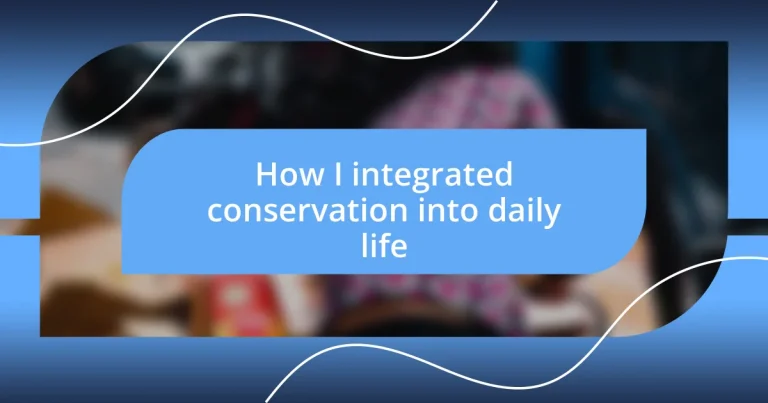Key takeaways:
- Daily conservation practices, such as composting and reducing energy use, can significantly lower waste and enhance personal empowerment.
- Engagement in community conservation efforts, like local clean-ups and supporting eco-friendly products, fosters connections and a sense of belonging.
- Measuring and tracking one’s conservation impact through journaling or apps provides motivation and reinforces commitment to sustainable choices.
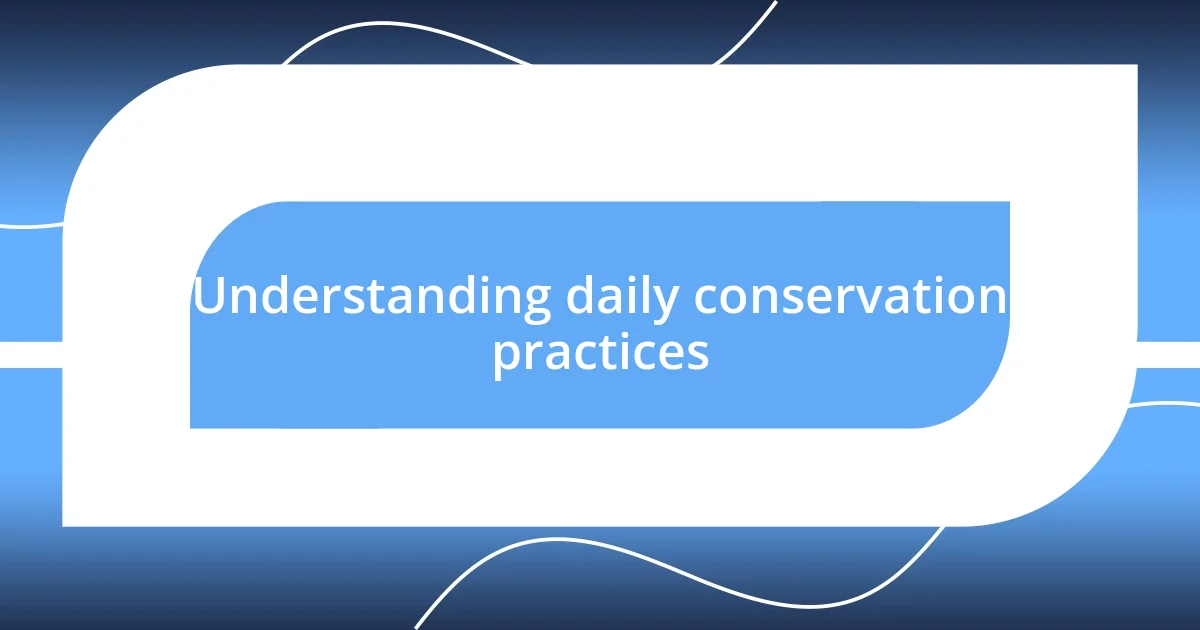
Understanding daily conservation practices
Daily conservation practices are often simpler than we realize, yet profoundly impactful. For example, when I first started composting, I was surprised by how much waste I was able to divert from the landfill. It felt rewarding to repurpose what I once considered trash into nutrient-rich soil for my garden. Have you ever thought about how your discarded food can come back to life in another form?
Incorporating eco-friendly habits into my routine also meant making mindful choices while shopping. I remember the first time I opted for products with minimal packaging; it felt like a small yet significant step toward reducing my carbon footprint. I often wonder if others feel similarly empowered by our purchasing decisions. Do we recognize the influence we hold as consumers?
Even simple changes, like turning off lights and unplugging devices, can help conserve energy. Initially, I struggled with remembering to do this, but I soon developed a habit that felt second nature. This daily discipline not only lowered my energy bill but gave a sense of control over my environmental impact. How often do we consider the ripple effects of our small actions?
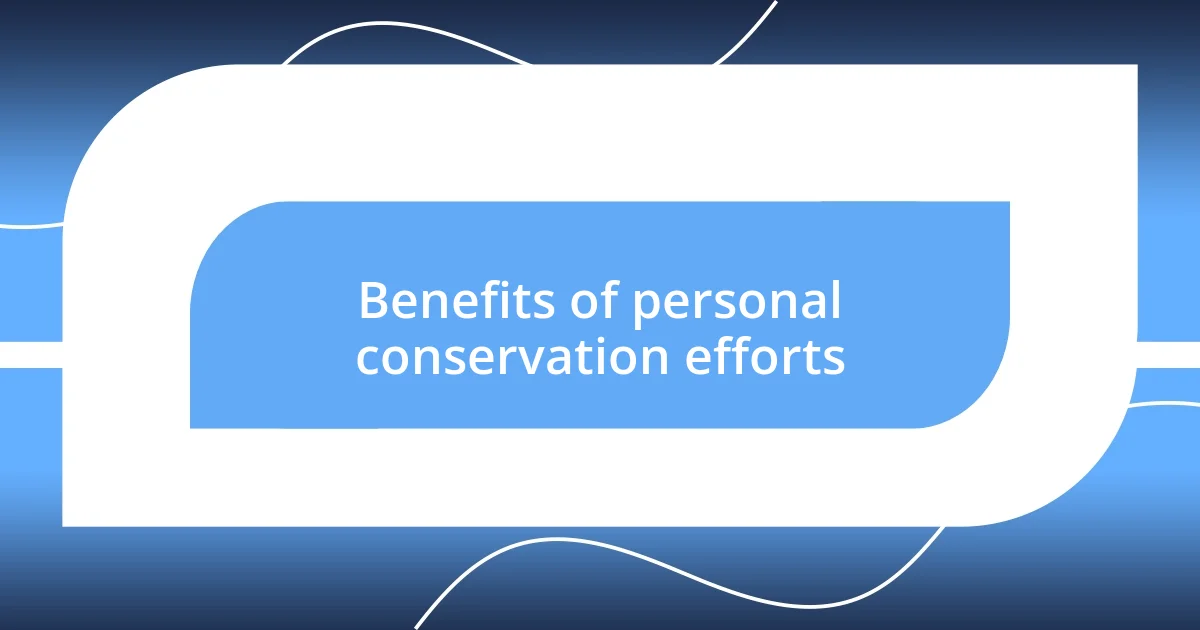
Benefits of personal conservation efforts
Conservation efforts in our daily lives can lead to substantial financial savings. For instance, when I swapped out traditional light bulbs for energy-efficient LEDs, my electricity bill dropped noticeably, allowing me to allocate those funds towards more eco-friendly projects. It’s remarkable how a simple switch can impact my wallet and the environment positively. Have you noticed any ways to save money while being environmentally conscious?
Another significant benefit I’ve experienced is the deep sense of community that arises from personal conservation efforts. Joining local clean-up events and sustainability groups not only allows me to contribute but also connects me with like-minded individuals who share similar values. Those moments spent together in nature strengthen our bonds and deepen our commitment to conserving our planet. Have you ever felt that exhilaration from working towards a common goal with others?
Finally, recognize the boost in self-esteem that comes from making positive changes. Every time I choose to walk instead of drive for nearby errands, I feel a rush of pride knowing I’m contributing to healthier air quality. This mindset shift, from seeing my actions as a burden to viewing them as impactful choices, has transformed not only how I relate to my environment but also how I see myself. Have you experienced that empowering feeling from taking small, responsible actions?
| Benefit | Experience |
|---|---|
| Financial Savings | Switching to LEDs reduced my bills. |
| Community Engagement | Participating in local clean-ups built connections. |
| Self-Esteem Boost | Walking instead of driving enhanced my pride. |
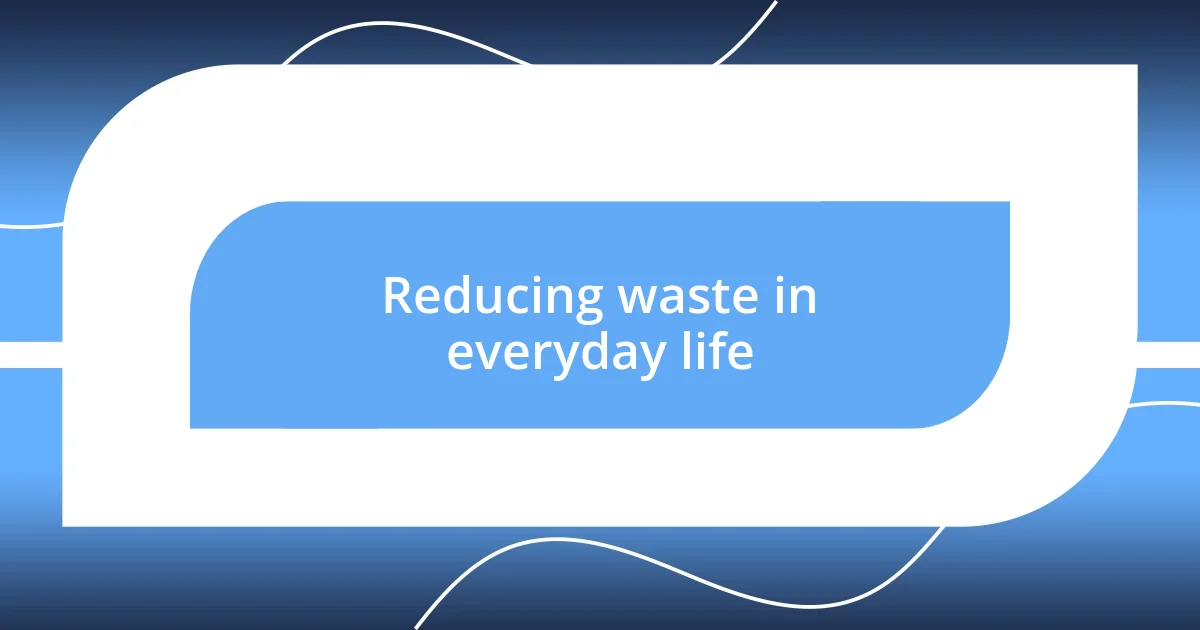
Reducing waste in everyday life
Reducing waste in everyday life has become a core part of my routine. I vividly remember the moment I replaced plastic bags with reusable ones while grocery shopping. It felt liberating to no longer contribute to the mountains of single-use plastics cluttering our landfills. Each small choice reinforces my commitment to sustainability, and I often feel a sense of pride as I pack my groceries into my eco-friendly bags.
To effectively reduce waste, here are some steps I’ve embraced:
- Invest in Reusable Containers: Instead of disposable plastic wrap, I use glass containers for leftovers, which keep food fresh longer and eliminate waste.
- Purchase in Bulk: By buying grains, nuts, and spices in bulk, I minimize packaging waste and often save money in the process.
- Say No to Straws: Whenever I go out, I skip straws, often prompting conversations about alternatives, which can inspire others in my circle to consider similar changes.
- Donate Unwanted Items: Instead of tossing items I no longer use, I’ve started donating them to local charities, giving them new life and reducing waste.
These shifts not only simplify my lifestyle but also reinforce my connection to the environment, turning waste reduction into a personal challenge that I genuinely enjoy.
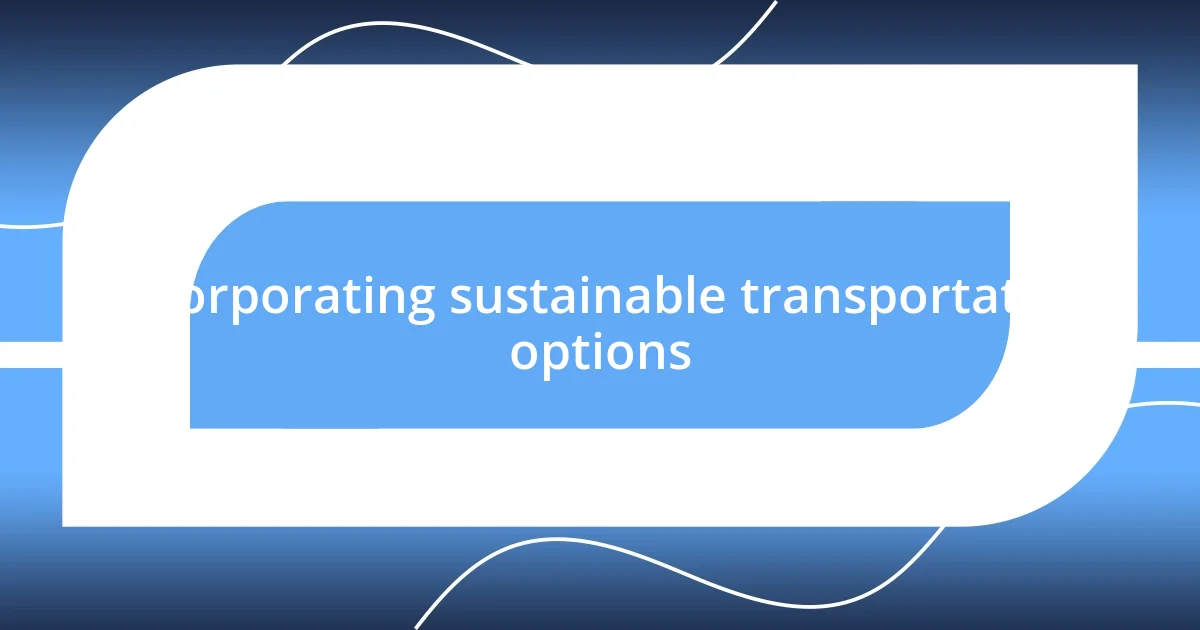
Incorporating sustainable transportation options
Incorporating sustainable transportation options has truly transformed how I navigate my day-to-day life. I remember feeling exhilarated the first time I hopped on my bike for a quick trip to the store instead of driving. The fresh air, the gentle workout, and the knowledge that I was reducing my carbon footprint all contributed to an incredible sense of freedom. Have you ever felt how invigorating it is to embrace a more active mode of transport?
Carpooling has also become part of my routine, especially for commuting to work with a few colleagues. Not only does it cut down on fuel costs, but it also fosters camaraderie during our shared journeys. There’s something special about those brief moments of connection before diving into the day’s hustle. How does it feel to share that kind of space with others, knowing you’re collectively contributing to a more sustainable environment?
Moreover, I’ve found public transit to be an amazing option, often opening up a world of unexpected interactions. Just the other day, I struck up a conversation with a fellow passenger about our favorite local parks, and it reminded me how much richer our lives can be when we opt for these communal experiences. Have you considered how tapping into public transportation can create not only convenience but also opportunities for community connection?
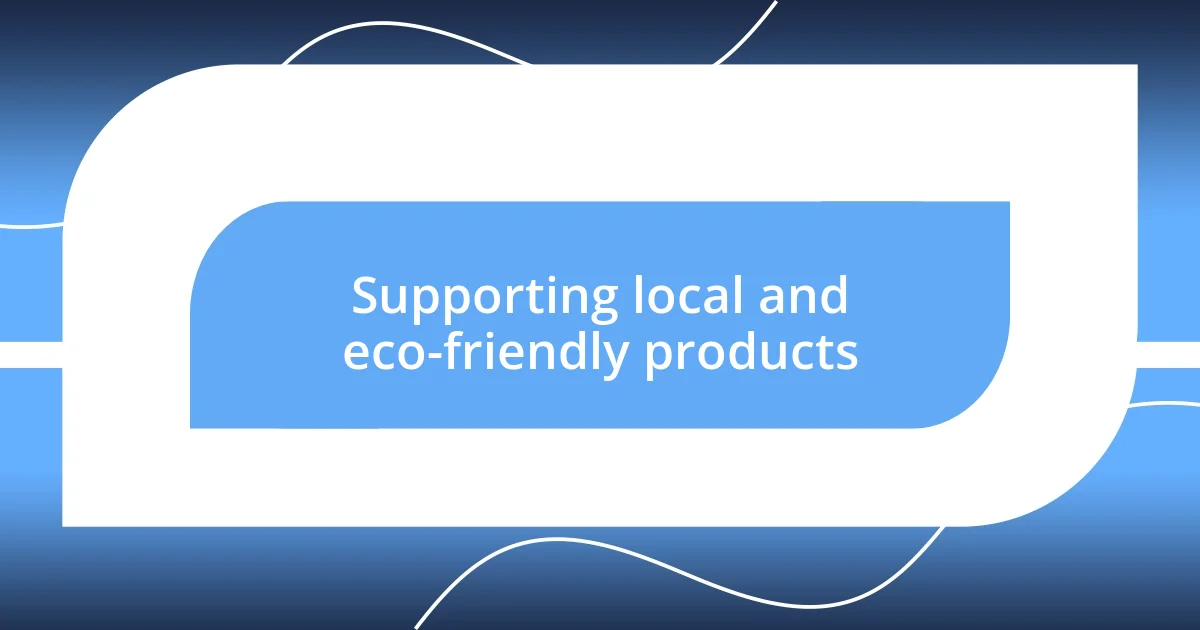
Supporting local and eco-friendly products
Supporting local and eco-friendly products has become a passion of mine, and I can’t help but feel a sense of excitement every time I discover a new local maker at the farmers’ market. The experience is more than just shopping; it genuinely feels like connecting with my community. Have you ever noticed how much easier it is to trust products when you know their origins?
I remember purchasing a handmade candle from a local artisan last winter. The scent of lavender and the warm glow it provided made my evenings more peaceful while supporting someone’s craft. This small choice added a personal touch to my home, and I felt good knowing my purchase contributed to sustainable practices. It’s incredible how such simple decisions can have both emotional and environmental benefits, right?
Additionally, I’ve become more mindful of my clothing choices. By opting for brands that prioritize eco-friendliness and ethical production, I’m not just adding items to my wardrobe; I’m investing in a more sustainable future. I often ask myself: how does this purchase impact the planet? This approach not only minimizes my environmental footprint but also encourages conversations about conscious consumerism with friends who often join me in exploring local boutiques.
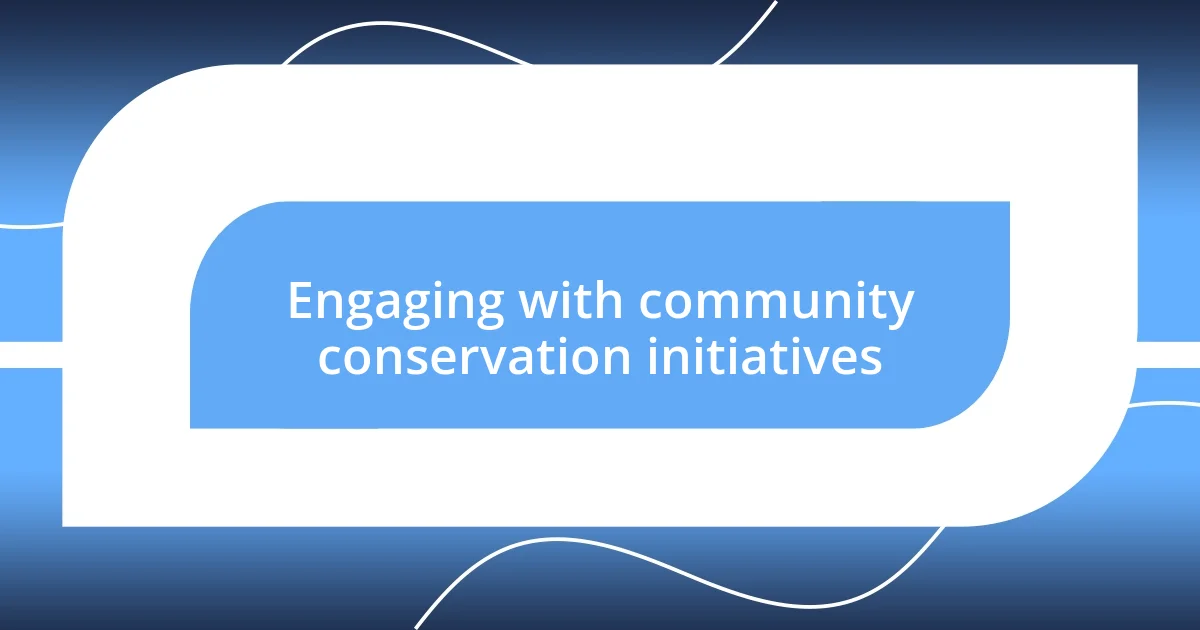
Engaging with community conservation initiatives
Engaging with community conservation initiatives has truly opened my eyes to the power of collective efforts in preserving our environment. I recall the first time I participated in a local beach cleanup; it was both humbling and gratifying. The sense of camaraderie among volunteers was palpable, reminding me just how invested we all are in the health of our planet. Have you ever felt that rush of purpose while working side by side with others for a common goal?
One of my favorite experiences has been volunteering with a community garden project. Not only did I get my hands dirty, but I also formed friendships with neighbors I never would have met otherwise. Witnessing our shared efforts come to fruition as we harvested fresh vegetables fostered a deep sense of belonging. How rewarding is it to see your hard work translate into fresh, healthy food for those in need?
Moreover, I’ve learned the importance of supporting local conservation programs, such as tree planting events. I remember planting my first sapling and imagining how it would grow and flourish, providing shade and clean air for years to come. This personal investment in our community’s green future has made me reflect on the legacy I want to leave behind. Have you considered how your actions today can nurture the environment for generations to come?
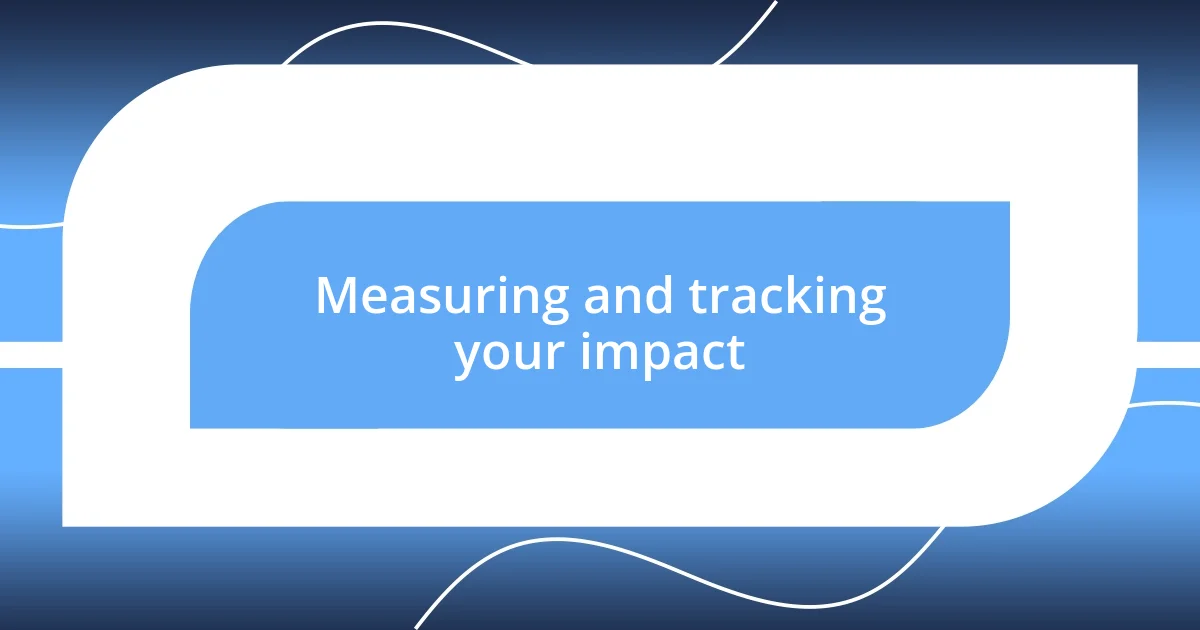
Measuring and tracking your impact
Tracking your impact in conservation can be both a rewarding and enlightening process. I started by keeping a simple journal, jotting down my eco-friendly choices each day, from using reusable bags to conserving water. It’s eye-opening how those seemingly small decisions add up over time. Have you ever calculated the difference your daily actions make?
Using apps designed for sustainability has also transformed the way I measure my impact. One tool I love tracks my carbon footprint based on my lifestyle choices. When I receive updates showing improvements, it motivates me to strive for even more significant changes. Isn’t it reassuring to see tangible evidence of progress?
I’ve found that engaging with friends on this journey amplifies the experience. We’ve created a shared spreadsheet, where we celebrate milestones like reducing waste or increasing plant-based meals. This camaraderie not only holds me accountable but also inspires me to push my limits further. Have you thought about how sharing your journey could enrich both your experience and those around you?












